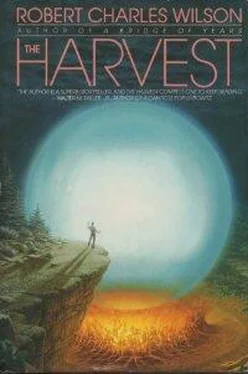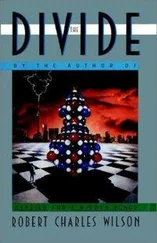He felt driven by the need to see Lillian and speak to her; or, if not, to know what had overtaken her, know precisely what maze of transformation she had stumbled into. Maybe he wasn’t being reasonable. He didn’t care. She was his patient.
“Lillian?” He stepped into the kitchen; it was empty. “Lillian!” Shouting up the stairs.
Jim, too fragile to stop this, stood aside and gazed at him with a vast sadness in his cavernous eyes. “Matt,” he said finally. “Matt, please stop. She’s in the bedroom off the hallway.”
He hurried there and threw open the door.
Lillian was naked on the bed.
Her ribs were stark against her papery flesh, and her eyes were as strange as her husband’s, though browner. She raised her head to look at him and seemed unsurprised by his entrance.
Her legs were spread. There was no blood, but Matt recognized with horror that she had delivered… something.
It resembled a shriveled homunculus—a monkey fetus, perhaps, as preserved on the shelf of some medieval apothecary. It was quite dry, quite motionless.
His horror was overtaken by an immense, weary sorrow. He looked at Lillian. Her face was bland. She had wanted a baby very badly. “Lillian,” he whispered. “Dear God.”
“Matt,” she said calmly. “You don’t understand. This is not the baby. You must understand that. This is only an end product. The baby is with us! He’s been with us for some months now. A boy. He’s alive, Matt, do you understand me?” She tapped her head. “Alive here.” And spread her arms. “Here.” The Greater World.
She smiled a bloodless, paper-thin smile. “We named him Matthew.”
* * *
He arrived at Miriam Flett’s small house grateful for the anesthetizing noise of the storm. The roar of the wind had become so intense it was hard to think. Which was good. He didn’t want to think.
Miriam met him at the door, a small woman, her spine curved with what Matt diagnosed as a mild osteoporosis. Her expression was grim. “You’re late.”
“I had some trouble on the way over.”
“You look sick, Dr. Wheeler. Are you sick?”
“Miriam, I may very well be, but we don’t have time to worry about it. We have to get you to shelter.”
“I told Abby on the phone—I have shelter.”
It was an invitation to argue that Matt did not accept. “Are these your bags?” Two pale gray Tourister cases.
“Yes,” she admitted. He picked them up. “Well,” she said. “All right. But they’re heavy. Be careful.”
He carried them to the trunk of the car, came back to help her into a bright yellow raincoat. He took her arm, but she resisted. “My journals!”
“What?” The door was open and the wind was shrieking.
“My journals.”
“Miriam, we don’t have time!”
“We would have had time if you hadn’t been late.” She stamped her foot. “I won’t leave without my journals!”
Have mercy, Matt thought. How many minutes back to the hospital? And what were his chances, in that time, of staying on the road? “Damn it, we simply can’t—”
“There’s no call for profanity!” Shouting to make herself heard.
He closed his eyes. “Where are they?”
“What?”
“The journals! Where are they?”
She took him to the kitchen, where it was marginally quieter, and pointed to three shelves of bound notebooks so full of newspaper clippings they were bent as round as bread loaves.
Matt gathered up an armful.
“No!” Miriam shrieked. “They’ll get wet!”
“I can carry them to the car. I can’t make it stop raining.”
“Don’t be testy! Here.” She shrugged out of her raincoat and draped it over the journals.
“Miriam—you’ll be soaked to the bone.”
“I’ll dry out,” she said.
He took her to the car, helped her inside, and piled the journals at her feet. She slammed the door to keep the rain away from the books, narrowly missing the fingers of Mart’s left hand.
He climbed in behind the wheel and advised her to fasten her seat belt. The engine stuttered a little when he cranked it, as if some moisture had crept in where it didn’t belong.
He said as they pulled away from the curb, “Have you talked to Abby? She must be worried.”
The wipers, on double-speed, did very little to improve visibility. The road in front of him was a liquid blur.
“I would have liked to talk to Abby,” Miriam said, “but the phone stopped working twenty minutes ago. Dr. Wheeler, may I ask why you were so late?”
“Believe me, Miriam, it isn’t something you want to know.” She examined him over the rims of her eyeglasses and rendered a judgment: “Maybe you’re right.”
* * *
He took a different route back to the hospital, longer but higher; he was afraid of flooding down by the marina. The road rose along the foothills of Mt. Buchanan and Matt was forced to crawl along in the breakdown lane, away from the winds that had begun to sweep up the hillside with devastating force. Many of the houses he passed were already windowless and the road surface was littered with broken glass. Debris rolled past the car at a constant rate—loose garbage bins, cardboard boxes, green matter.
At the apex of the drive, where the road began a descent into the hospital district, the battering rain suddenly eased. Matt spared a glance to the west. The clouds, skimming overhead at a dizzying speed, had briefly lifted. He could see the water of the bay driven up beyond the marina and nearly to Commercial Street, the hulls of overturned pleasure boats bobbing level with the roofs of warehouses and restaurants. The bay itself was a furious caldron, though calmer than the sea beyond, where waves the size of houses battered the stony southern tip of Crab Pot Island. The last daylight came from the west—seemed to come from the storm itself, a strange, weak radiance.
He turned his attention back to the road and swerved to avoid a cartwheeling tree limb. The wind made his steering awkward; it was like driving into a tide of molasses.
“Dear God,” Miriam said suddenly. “Look at that.”
And he looked again, reluctantly, toward the west.
Offshore, the racing overcast had begun to dimple.
Black clouds grew lazy tails, which spiraled toward the sea.
Where they touched, white foam erupted.
Waterspouts, Matt thought. He counted five of them. It was fascinating, almost hypnotic, how they moved. There was something awful about their twisting, like the lash of a cat’s tail, plucking the water here and there, then lifting and falling again. Moving in the dim light. Moving toward shore.
A sudden curtain of rain obscured the view.
“Maybe you had better drive a little more quickly,” Miriam said.
* * *
Everything would have been all right, Abby Cushman thought, except for the ventilator ducts.
The storm was way too big, and coming way too fast, and Matt Wheeler was still out there somewhere, hadn’t even arrived at Miriam Flett’s house when the phones went dead… and then the lights in the basement cafeteria began to dim, and Tom Kindle ambled away to some other corner of the building to start up a generator, leaving Abby alone with six more or less terrified people in the flickering dark… and all this would have been endurable, except for what she had begun to think of as the God Damn Noise.
She had no idea how the hospital was ventilated. She knew only that several pressed-tin ducts ran along the ceiling above the fluorescent fixtures, and that the wind had somehow penetrated these conduits. Worse, the wind had begun to play them like a pipe organ. Not any ordinary pipe organ, Abby thought, but a pipe organ for mastodons and great whales; a pipe organ that produced sounds too fundamental for the human ear, perceptible only, like fear, in the hollow of the stomach.
Читать дальше












